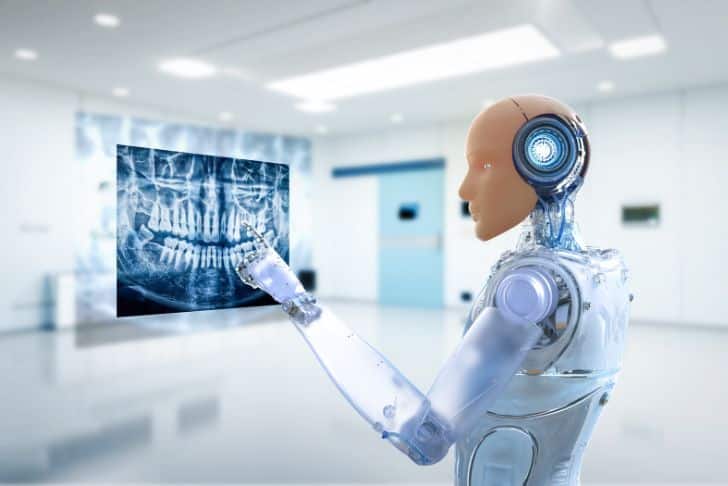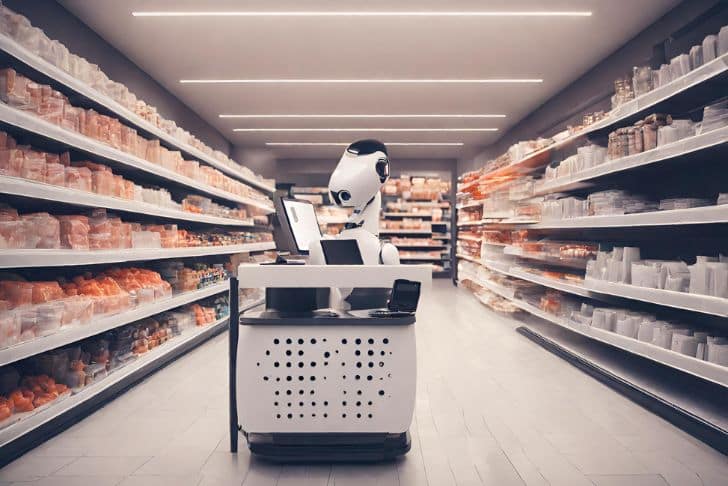Your lives have become closely entwined with artificial intelligence (AI), even without you realizing it. From healthcare to retail, agriculture to entertainment, this piece thoroughly explores 15 riveting applications of AI across multiple sectors. You’ll discover how healthcare incorporates AI for disease detection, personal medicine, and mental health support, for example, and how manufacturers apply AI for supply chain optimization and quality control. You will uncover how AI-driven robo-advisors are reshaping wealth management in finance and how augmented reality and interactive art powered by AI are revolutionizing the entertainment sphere. You’ll see the applications in a newfound light, understanding how AI transforms not just the industries of today, but is paving the way forward for tomorrow as well.

AI’s Impact on the Finance Sector
AI has made a considerable impact on the finance sector. Its prowess is harnessed in several areas, such as fraud detection, trading, risk assessment, compliance, and wealth management.
Use of AI for Fraud Detection
AI’s advanced algorithms can detect anomalies and irregular patterns in transactions that can point towards fraud. By sifting through massive data sets, Artificial intelligence can identify potential fraud incidents in real time and thwart them before they occur. This way, you can trust your financial transactions are safe and secure.
AI in Algorithmic Trading
Algorithmic trading utilizes AI to make high-speed, automated trading decisions. Based on certain rules set by the trader, Artificial intelligencecan analyze market conditions in real time and execute trades at the best possible moments. This not only saves you time but also minimizes human error.
Risk Assessment via AI
AI makes risk assessment more accurate than ever. With data and machine learning, AI can identify and assess financial risk factors much faster than traditional methods. By analyzing multiple data sets simultaneously, Artificial intelligence provides a comprehensive view of potential perils, preparing you to manage financial risks efficiently.
Compliance Regulations through AI Instruments
Compliance regulations often require extensive manual tasks. AI simplifies these tasks by automatically evaluating compliance levels and identifying any discrepancies. This allows you to focus on strategic tasks and ensure your operations remain within the set regulations without investing in much manpower.
Wealth Management using AI-based robo-advisors
AI has democratized wealth management, thanks to robo-advisors. These automated, AI-driven platforms provide financial advice and investment management services at a fraction of the cost of traditional advisors. By answering a few questions about your financial goals, robo-advisors can tailor an investment strategy just for you.
Applications of AI in Manufacturing
From quality control to supply chain optimization, AI has a multitude of uses in manufacturing.
AI for Quality Control
Artificial intelligence enables constant, round-the-clock inspections for quality control. Unlike human inspectors, AI-powered systems don’t tire, resulting in fewer errors. By continuously monitoring the production process, AI captures defects in products, enhancing the overall quality.
Predictive Maintenance with AI
With its ability to analyze vast data sets, AI can predict when manufacturing equipment might fail. This predictive maintenance minimizes downtime, saving you from expensive repairs and unexpected delays.
Supply Chain Optimization Leveraging AI
Artificial intelligence can analyze and optimize multiple aspects of the supply chain. From inventory and route planning to delivery scheduling, AI makes supply chain operations more efficient and cost-effective.
Creation of Digital Twins for Performance Simulation Using AI
AI is used to create digital twins – virtual replicas of physical systems – which simulate performance in different scenarios. This helps predict the outcomes of design changes without actual implementation, saving time and resources.
How AI is Transforming Transport
Transportation has experienced a sea change with AI-powered applications such as self-driving vehicles, intelligent traffic systems, route optimization, and drone delivery.
Self-Driving Vehicles
AI is the backbone of self-driving vehicles. By processing data from onboard sensors and cameras, AI-powered software can make real-time decisions like identifying obstacles, changing lanes, and turning at intersections.
Intelligent Traffic Management Systems
In urban areas, AI can analyze traffic in real-time, optimize traffic signal timings, and suggest route alterations for smoother transportation. AI-backed systems befittingly adapt to changes and decrease congestion, making your commute easier.
Route Optimization using AI
AI can analyze a multitude of factors like traffic, road conditions, and distance to find you the fastest route. This could be for daily commuting or for businesses to optimize delivery routes, saving time and fuel costs.
Drone Delivery Systems
AI-powered drone delivery systems are fast becoming the new norm for logistics. From dropping medical supplies in remote areas to delivering products in urban areas, AI-controlled drones are a highly efficient mode of transport.

Role of AI in Healthcare
AI’s contributions to healthcare are myriad; it aids in disease detection, medicine personalization, drug discovery, mental healthcare, and patient data monitoring.
Early Disease Detection using AI
AI algorithms can detect diseases such as cancer or heart conditions at their early stages. By analyzing medical imaging, blood tests, and patient history, AI provides quicker and more accurate diagnoses, enabling timely treatment.
Personalized Medicine through AI
By analyzing genetic data, AI can make personalized medicine a reality. AI can predict how individuals will respond to specific treatments, leading to custom-tailored plans that boost the efficacy of treatments and minimize side effects.
Drug Discovery with AI
AI fast-tracks drug discovery by analyzing molecular structures and predicting their effectiveness against diseases. This accelerates the time-consuming process of new drug development, saving time and money.
Mental Healthcare Support via AI
AI can offer initial mental health support by analyzing patient behavior and responses. AI chatbots can guide patients through therapy exercises or provide reminders for medication, bridging the gap between patients and mental health support.
Patient Data Monitoring using IoT and AI
AI, coupled with IoT devices, can continuously monitor patient vitals, sending alerts in case of any anomalies. These real-time updates assist healthcare providers in providing timely interventions.

Wealth Management with AI
AI offers various benefits to the wealth management sector, including high-frequency trading, portfolio management, investment decision predictions, and regulatory compliance.
Use of AI for High-frequency Trading
High-frequency trading relies on AI’s advanced computing capabilities. AI analyses millions of transactions in microseconds and with high accuracy, ensuring you get the best deals.
Machine Learning for Portfolio Management
AI’s machine learning algorithms can construct and manage a diversified portfolio based on your risk tolerance and investment objectives. This differs from traditional methods, which are more time-consuming and susceptible to human biases.
AI-Based Predictions for Investment Decisions
Artificial intelligence can predict financial market trends, guiding your investment decisions. These predictions are based on vast and varied data analyses, including economic indicators, social sentiment, and political scenarios, making them more reliable.
Artificial Intelligence in Regulatory Compliance
AI makes it easier to navigate the complex financial regulations. By ensuring real-time monitoring and early detection of non-compliant activities, AI aids in complying with regulatory norms and avoiding fines.
Adoption of AI in Agriculture
AI aids in various agricultural processes such as crop monitoring, yield prediction, precision farming, and autonomous tractors, leading to higher crop yields and environmental conservation.
Crop Monitoring with the help of AI
AI can monitor crops at different growth stages, detect diseases, and predict yields. With this information, farmers can take early corrective measures and optimize crop health.
Yield Prediction using AI
Artificial intelligencecan analyze data from previous harvests, weather forecasts, and soil conditions to predict crop yields accurately. This helps farmers plan their sales and logistics in advance.
Precision Farming via AI
AI empowers precision farming by analyzing soil conditions, weather data, and crop health to optimize water and fertilizer usage. By cutting wastage and reducing input costs, AI can increase farm profitability.
Autonomous Tractors controlled by AI
AI-controlled autonomous tractors can work round the clock, execute precision farming tasks such as seeding and harvesting, and navigate the field using GPS – all without a driver.
Impact AI has on the Retail Industry
Every aspect of retail, be it inventory management, marketing, customer service, or visual search, has been impacted by AI.
Inventory Management using AI
Artificial intelligence can predict demand based on sales history, seasonality, and market trends, optimizing inventory levels. With sufficient stock levels, you can prevent overstocking or understocking and maintain an efficient supply chain.
AI for Targeted Marketing
AI’s data analysis skills tailor marketing campaigns to consumer interests and behavior patterns. This personalized approach results in increased customer engagement and conversion rates.
Customer Service Support with AI
AI chatbots handle customer queries swiftly and accurately, 24/7. By redirecting complex cases to humans, they improve customer service efficiency and satisfaction.
AI-Driven Visual Search Technologies
With AI, customers can find products using images instead of text-based searches. By analyzing visuals, AI can identify products and guide customers to their desired purchases.
Artificial Intelligence in the Field of Education
AI aids in personalized learning, plagiarism detection, student performance prediction, language translation, and virtual tutoring, optimizing the education process.
Personalized Learning through AI
AI can adapt to a student’s learning pace and style, personalizing content to cater to individual needs. This personalized approach enhances learning experiences and outcomes.
Plagiarism Detection with AI
Plagiarism detection is vital to maintain academic integrity. By comparing a document against a vast data set of existing works, AI can identify duplicated text, ensuring original work.
AI in Student Performance Prediction
By analyzing previous grades, attendance, behaviour, and other factors, AI can predict a student’s future performance. This allows educators to identify and support students who may require additional help.
Language Translation by AI
AI’s language translation capabilities break down language barriers in education. With AI, students can easily access and understand material in different languages, making global education more inclusive.
Virtual Tutoring using AI
AI-powered virtual tutors provide personalized tutoring, reinforcing classroom learning. They can provide guidance, answer questions, and even assign personalized homework.
Implications of AI in the Energy Sector
Artificial intelligence aids the energy sector in crucial areas such as demand forecasting, renewable energy optimization, and energy conservation.
AI for Demand Forecasting
AI can forecast energy demand accurately by analyzing historical usage data, weather, and other variables. This allows energy producers to manage resources efficiently.
Renewable Energy Optimization through AI
Artificial intelligence can optimize the generation and storage of renewable energy. By analyzing weather conditions, AI can predict the best times to generate wind or solar power.
AI in Energy Conservation
Artificial intelligence can monitor and optimize energy usage in homes and industrial establishments. By identifying wastage and suggesting improvements, AI helps in conserving energy and reducing carbon footprint.
Incorporating AI in Human Resources
AI assists in vital HR tasks such as resume screening, recruitment, workforce planning, diversity and inclusion initiatives, and performance monitoring.
AI for Resume Screening
Resume screening can be time-consuming. Artificial intelligence simplifies this by quickly shortlisting candidates based on job descriptions and requirements, saving significant HR hours.
AI-Powered Recruitment
Artificial intelligence streamlines the recruitment process by scheduling interviews, answering candidates’ queries, and providing regular updates. By automating routine tasks, AI makes the recruitment process more effective and less time-consuming.
Workforce Planning using AI
AI can predict attrition rates, productivity levels, and the workforce skills needed for future projects. This helps HR teams plan their workforce effectively.
Leveraging AI for Diversity and Inclusion Initiatives
AI can identify any unconscious bias in job descriptions or during hiring processes. By ensuring fair recruitment, AI promotes diversity and inclusion in the workplace.
Performance Monitoring with the Help of AI
AI can analyze various performance metrics to provide insights about employee productivity and engagement. This helps HR implement strategies to enhance employee performance and satisfaction.

